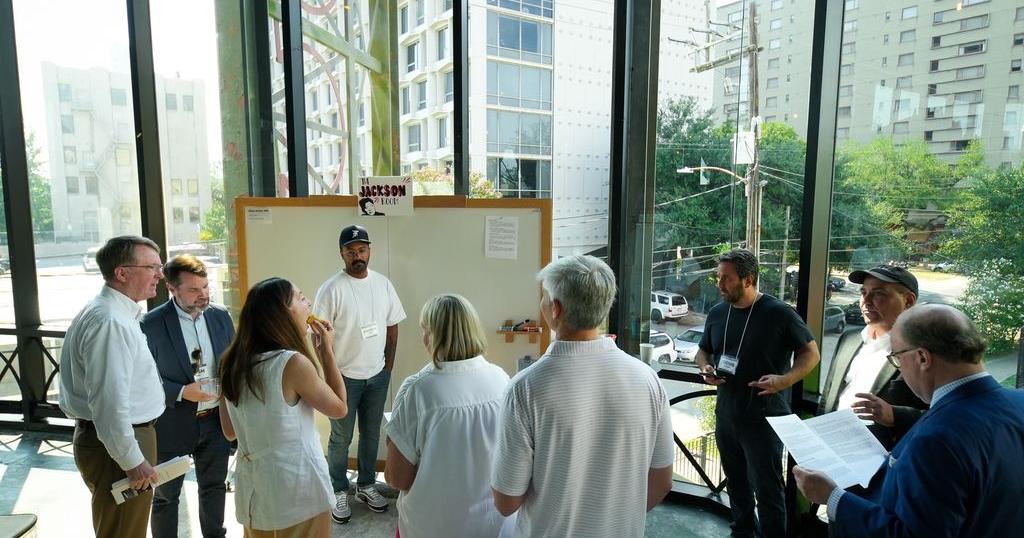In the summer of 2000, a handful of entrepreneurs and civic activists met at the Loa Bar in downtown New Orleans and decided to invest in a business plan competition they hoped would ignite an economic spark in a city suffering from an exodus of young professionals.
Some consider that moment the unofficial launch of an “entrepreneurial ecosystem” that has grown over time to support the founders of hundreds of startup companies emulating the success coming out of Silicon Valley and the nation’s other tech hubs.
Earlier this month, several members of that original Loa group were among more than 50 current and former business and civic leaders to participate in an event looking back at the history of the New Orleans startup scene and planning where it goes next in the latest era of uncertainty for the city.
Meeting at The Nieux, a startup-focused event space on St. Charles Avenue, the group spent five hours in AI-assisted brainstorming sessions to help identify challenges and opportunities for local economic development.
The first tangible outcome of the meeting is the formation of the NOLA Entrepreneurship Council, a “working group that will take up issues, from policy to funding to quality of life, that are critical to the success of our innovation ecosystem,” said Michael Hecht, president and CEO of Greater New Orleans Inc., the city’s economic development nonprofit. Hecht was one of the participants at the Nieux event.
Other proposals include funding an online dashboard that tracks startup activity in the region, lobbying the next mayor of New Orleans to hire a director of innovation and creating an ambassador program to connect local entrepreneurs with peers outside the city.
The entrepreneurship council, which hasn’t had its first meeting yet, plans to release the complete list of ideas soon.
Tim Williamson, co-owner of the Nieux and a member of the original Loa group, said the brainstorming event — paid for by several local organizations, agencies and entrepreneurs — was inspired by a trip he took to an innovation conference earlier this year with Kimberly Gramm, the leader of the three-year-old Tulane Innovation Institute.
“We came back thinking that New Orleans is actually ahead of most of that crowd because we’ve been around for 25 years,” Williamson said. “Leaders who arrived in the last five years have no idea how we got here, so we hope this event helps pass the torch to them.”
The Nieux event also was a chance to reflect on an evolving ecosystem.
Before Katrina, the nonprofit startup accelerator The Idea Village and GNO Inc. were the two most prominent organizations promoting entrepreneurship in the region.
Since then, other accelerators and incubators — including Propeller, which focuses on entrepreneurship as a force for social change; and the New Orleans BioInnovation Center, which provides labs for science startups — have emerged. New investors like the New Orleans Startup Fund, the Gulf South Angels, Benson Capital Partners and Boot64 Ventures have created more funding opportunities. And innovation has become a priority for local universities, health care systems and state government.
Andy Stoll, an Omaha-based entrepreneur and consultant who has connections to New Orleans, said those changes demonstrate the evolution of the scene from a civic enterprise to something more institutional.
“Fifteen years ago, some of these organizations wouldn’t give some of these entrepreneurs the time of day,” Knoll said. “Now, they have signed onto this.”
The results, 25 years later, have been mixed. The local entrepreneurial ecosystem hasn’t given New Orleans its own Google or Amazon, but several local tech startups — including Lucid, Levelset and Turbosquid — have had a total of $2.8 billion in “exits,” the tech world’s terminology describing liquidity events for founders and investors.
The underlying questions for participants in the Sept. 12 brainstorming session were how to create the next Lucid or Levelset, and how to build companies that will grow through acquisitions of their own, retaining local jobs and corporate headquarters in the process?.
Participants identified challenges for the city that include a frustrating permitting process, an aging population, increased cybersecurity threats and a shortage of health care professionals.
Several people emphasized the opportunity to turn those challenges into opportunities.
“We’re living in a laboratory for climate change, so we ought to be able to come up with ideas to build businesses in that space,” said Allen Bell, an executive at a local housing nonprofit.
Disaster recovery was identified as another area of expertise to be exploited.
Many participants said there’s nothing more important to the city than fixing quality-of-life issues, which are impediments to investment. Bill Hines, managing partner of the law firm Jones Walker, encouraged the group to aim higher.
“It would be pitiful if our biggest initiative is getting garbage pickup right,” he said.
